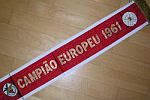O ano chega-se ao fim e apesar do facto de não ter adicionado muitos posts, não quero deixar passar a oportunidade de desejar aos leitores deste blog uma boa passagem de ano e um feliz ano novo. Para terminar este ano, deixo aqui mais uma camisola especial para apreciarem.
António Augusto de Sousa Veloso, chamado Veloso, nasceu a 31 de Janeiro 1957 em São Joao da Madeira. Inscreveu-se no clube da terra natal, o AD Sanjoanense, com 13 anos e completou a sua formação la, tornando se profissional em 1976. Prosseguiu a sua carreira no Beira Mar a partir de 1978, destacando-se pela polivalência no sector defensivo. Sendo defesa direito de preferência, ocupou todos lugares até ao médio defensivo durante a sua carreira. Como benfiquista desde criança, rejetou convites do Porto e Sporting para representar os respectivos clubes, e para aceitar a proposta do Benfica em 1980.
Estreou-se num amigável contra o Panhellenic de Toronto, onde veio do banco marcando o seu primeiro golo (de 13 em total ao longo de 15 épocas) de manto sagrado. Seguiram-se muitos mais jogos, muitos deles a titular, nessa época de estreia.
Ao longo dos anos tornou-se um pilar da defesa do Benfica, atuando principalmente como defesa direito, mas como ja referi antes, também jogou no eixo esquerdo, tal como central, e mesmo médio defensivo. Foi capitão de equipa 322 vezes, o que apenas deixa ultrapassar Luisão e Mario Coluna.
Uma vez ele disse que teve uma boa carreira e que apenas de um penalti falhado é o que mais se fala. Pois, provavelmente foi isso a única coisa que faltou: um titulo europeu. Mas reduzir uma carreira repleta de titulos (16 oficiais), a um jogo só, é algo ingrato porque António Veloso ja nesse momento se tinha tornado numa lenda do clube, e apenas se encontrava a meio da carreira.
Pela Seleção atuou 40 vezes, fazendo parte da comitiva portuguesa em 1984. Falhou o Mundial de 1986 por um teste antidoping errado, mas ao fim nem se sabe se foi melhor assim, devido ao caso Saltillo que pôs uma grande sombra sobre a presença de Portugal no México.
Esta camisola foi utilizada por ele na segunda mão da Supertaça Cândido Oliveira em 1986 contra o FC Porto. Um jogo de má memória para o mundo benfiquista. Tem a particularidade do número especial, que apenas foi aplicado nas camisolas para as duas finais da Supertaça.
This year is coming to the end, and besides not having posted much here during the year, i would like to take the opportunity to wish all the readres and followers a happy and great new year. Last but not least, i leave you with another quite special shirt.
António Augusto de Sousa Veloso, better known as Veloso, was born on 31st Jan. 1957 in Sao Joao da Madeira. At the age of 13 he started his career at the club of his hometown, AD Sanjoanense. He completed his formation and became professional, before moving on to Beira Mar in 1978. His versatility in the defensive sector caught the interest of clubs like Porto and Sporting, but he refused to sign as a "benfiquista" and was lucky enough when he was contacted by Benfica. In 1980 he signed contract with them and had his first match vs Panhellenic Toronto, where he came from the bench and even managed to score his first goal (of only 13 in 15 years). He immediately became first choice and regular starter in his first season.
Along the years he became one of the most influential players, playing every position in the defence. Altough his preferred position was rightback, he was often used as a leftback and even as central defender or defensive midfielder. He led the team 322 times as a captain, with only Luisao and Mario Coluna using the armband more often. His 541 official matches (plus more than 100 non official) earn him the second place in terms of matches played.
Once he said that he had a good career and that a missed penalty is what people talk about. And in fact, a european title is missing in his vita. But reducing a whole career of 16 titles to a single match is some kind of unfair, as he was already a legend of the club and just in the middle of it.
On a national level he represented the county 40 times and was called to the 1984 Euro. He somehow missed the 86 WC due to a positive dopingtest, that later was invalidated by a negative B-test. In the end one may say that it was better not having been part of the team, that was involved in the disruptions, later known as "Saltillo case".
Coming to the shirt: this one was used by him during the second hand of the 1986 Supercup vs Porto. It is special because this kind of numbering was only used for the two matches of this competition in that season.
Jogo/ match: 26.11.1986 Benfica vs FC Porto 2:4
Fornecedor/ outfitter: Adidas













